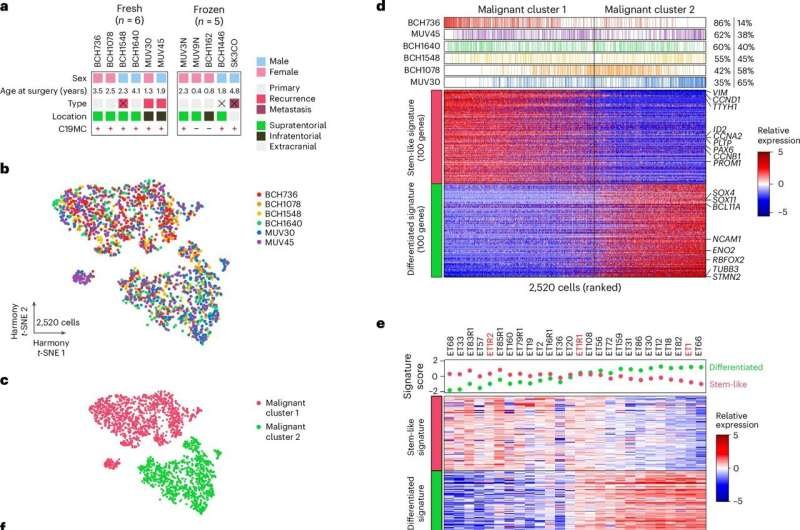
A study led by researchers at Dana-Farber/Boston Children’s Cancer and Blood Disorders Center and the Broad Institute of MIT and Harvard has uncovered critical insights into the biology of embryonal tumor with multilayered rosettes (ETMR), a rare and aggressive brain tumor affecting young children.
The findings, published in Nature Cancer, offer promising avenues for targeted therapies that could improve outcomes for patients with this devastating disease.
ETMRs are driven by a unique genetic alteration known as the C19MC microRNA cluster, which keeps tumor cells in an immature and aggressive state. Through single-cell and spatial analysis of patient tumors, the research team discovered that ETMR cells mimic early brain development, forming a hierarchy of stem-like and neuron-like cells. This cellular cooperation is crucial for tumor growth, with more mature cells providing signals that help stem-like cells thrive.
Co-lead author of the study, Dr. Volker Hovestadt, explained, “We discovered that FGFR and NOTCH receptors are expressed by proliferative NSC-like cells, while more differentiated malignant cells within the same tumor supply the corresponding ligands, indicating a coordinated role in sustaining tumor growth. Targeting these interactions may represent a critical vulnerability in ETMR.”
The study highlights the potential of repurposing existing FDA-approved FGFR inhibitors, which have shown early signs of success in one patient treated under compassionate use.
“This is the first time we are able to look at this highly lethal tumor through this new lens of single cell sequencing,” emphasized Dr. Mariella Filbin, co-director of the Brain Tumor Center at Dana-Farber/Boston Children’s Cancer and Blood Disorders Center.
“It is fascinating how all tumor cells, even though different, help each other to survive and grow. Learning how to disrupt their cooperation, for example by blocking one of their communication lines, will be imperative to treat this cancer in the future.”
The study calls for further clinical trials to test FGFR and NOTCH inhibitors in ETMR patients and explores antisense therapies targeting C19MC miRNAs, which have shown promise in lab settings. These findings offer a powerful rationale for more effective targeted therapies, potentially transforming the treatment landscape for children with ETMR.
More information:
Alexander Beck et al, Cellular hierarchies of embryonal tumors with multilayered rosettes are shaped by oncogenic microRNAs and receptor–ligand interactions, Nature Cancer (2025). DOI: 10.1038/s43018-025-00964-9
Dana-Farber Cancer Institute
Citation:
FDA-approved FGFR inhibitors show promise against rare and aggressive pediatric brain tumor (2025, May 26)
retrieved 26 May 2025
from https://medicalxpress.com/news/2025-05-fda-fgfr-inhibitors-rare-aggressive.html
This document is subject to copyright. Apart from any fair dealing for the purpose of private study or research, no
part may be reproduced without the written permission. The content is provided for information purposes only.

